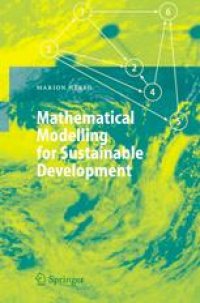
Ebook: Mathematical Modelling for Sustainable Development
Author: Dr. Marion Hersh (auth.)
- Tags: Math. Appl. in Environmental Science, Industrial Pollution Prevention, Environmental Economics, Probability Theory and Stochastic Processes, Economic Theory, Engineering Design
- Series: Environmental Engineering
- Year: 2006
- Publisher: Springer-Verlag Berlin Heidelberg
- Edition: 1
- Language: English
- pdf
Many people are convinced that Sustainable Development and Mathematics are completely unrelated. Sustainable Development, in its role of a value laden imperative for polluting and over-consuming societies, seems to be totally unconnected to mathematical reasoning and ignorant of the values behind its symbols. Still, they are not only connected: they need each other. Mathematics needs Sustainable Development. When science was gradually reinvented in European medieval societies, it was legitimised as contributing to the disclosure of God’s divine creation. The conflicts that emerged became well known as a result of the clash between Galileo and the Church. Science found a new legitimacy through recognition that it was a powerful force against superstition. In the Enlightenment the argument was pushed forward by attributing Progress to the advancement of science: science could produce a better world by promoting rationality. In our modern society, science has become intimately linked to technology. Science for its own sake unfortunately rarely has positive outcomes in terms of research grant applications. Meanwhile, science and technology, and the progress they are supposed to produce, meet with wide scale scepticism. We all know of the current global problems: climate change, resource depletion, a thinning ozone layer, space debris, declining biodiversity, malnutrition, dying ecosystems, global inequity, and the risk of unprecedented nuclear wars. Science has to engage with these problems or lose its legitimacy.
This book aims at providing both a basic introduction and advanced technical details of some of the available mathematical and computing methods, thus closing the exisiting gap in this field, as well as illustrating their use through case studies and examples. The methods presented here are targetted at sustainable development and the case studies and examples are all in this area, although they have a wide range of other applications, including economics, medicine and control systems
This book aims at providing both a basic introduction and advanced technical details of some of the available mathematical and computing methods, thus closing the exisiting gap in this field, as well as illustrating their use through case studies and examples. The methods presented here are targetted at sustainable development and the case studies and examples are all in this area, although they have a wide range of other applications, including economics, medicine and control systems
Content:
Front Matter....Pages i-xxx
Sustainable Development: An Overview....Pages 1-74
Introduction to Systems Ideas....Pages 81-90
Engineering Mathematics Representations....Pages 91-117
State Space System Representations....Pages 119-142
Mental Models, Sense Making and Risk....Pages 143-164
Systems Methodologies....Pages 165-188
Case Study: Reduction of Domestic Waste....Pages 189-224
Optimisation....Pages 237-259
Mathematical Background to Decision Making....Pages 261-292
Multi-Criteria Problems....Pages 293-318
Multi-Criteria Decision Support Methods....Pages 319-345
Case Study: Waste Management Options....Pages 347-375
Introduction to Fuzzy Sets....Pages 389-419
Fuzzy Set Operations....Pages 421-440
Augmented, Intuitionistic & Type 2 Fuzzy Sets....Pages 441-477
Augmented Fuzzy Set Ordering Algorithm and Third Order Augmented Fuzzy Sets....Pages 479-498
Case Study: Transport Decision Making....Pages 499-528
Looking Back and Moving Forward....Pages 535-541
Back Matter....Pages 543-557
This book aims at providing both a basic introduction and advanced technical details of some of the available mathematical and computing methods, thus closing the exisiting gap in this field, as well as illustrating their use through case studies and examples. The methods presented here are targetted at sustainable development and the case studies and examples are all in this area, although they have a wide range of other applications, including economics, medicine and control systems
Content:
Front Matter....Pages i-xxx
Sustainable Development: An Overview....Pages 1-74
Introduction to Systems Ideas....Pages 81-90
Engineering Mathematics Representations....Pages 91-117
State Space System Representations....Pages 119-142
Mental Models, Sense Making and Risk....Pages 143-164
Systems Methodologies....Pages 165-188
Case Study: Reduction of Domestic Waste....Pages 189-224
Optimisation....Pages 237-259
Mathematical Background to Decision Making....Pages 261-292
Multi-Criteria Problems....Pages 293-318
Multi-Criteria Decision Support Methods....Pages 319-345
Case Study: Waste Management Options....Pages 347-375
Introduction to Fuzzy Sets....Pages 389-419
Fuzzy Set Operations....Pages 421-440
Augmented, Intuitionistic & Type 2 Fuzzy Sets....Pages 441-477
Augmented Fuzzy Set Ordering Algorithm and Third Order Augmented Fuzzy Sets....Pages 479-498
Case Study: Transport Decision Making....Pages 499-528
Looking Back and Moving Forward....Pages 535-541
Back Matter....Pages 543-557
....